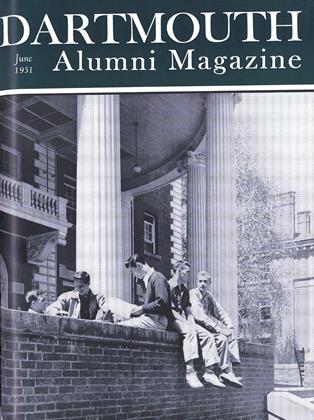IN response to President Dickey's question posed to all alumni—"How much does Dartmouth matter?"the answer, in terms of the 1951 Alumni Fund, is that it matters a great deal.
As of May 17, the mid-point in the 1951 campaign, a total of 1258,321 had been received an increase of $61,620 over the amount in hand on the same date last year. At that time in 1950, the average gift was 130.81; this year, on May 17, it stood at 141.63, an increase of 110.82.
31% Ahead in Dollars
In dollars, the Fund was running 31 per cent ahead of 1950, and this gain was registered even though the number of contributors at the mid-way point was down about 300 from the total at the comparable 1950 date. With the 1951 Fund objective set at $500,000, or 25 per cent more than in 1950, maintenance of the May 17 margin will send the final total over the goal, as has happened so often in past Fund campaigns, when Dartmouth men have understood the need of the College and have lifted their giving to the required level.
From now until the end of the 1951 campaign on June 30 the class agents will work strenuously on three fronts—getting each 1950 contributor back on the list, getting him to give in proportion to the greater need of the College, and building up participation among classmates who were missing last year. Special efforts in connection with this last group have produced encouraging results to date. Among the classes running ahead in contributors at the mid-way point were 1921, 1928, 1931, 1936, 1938 and 1949. With 62 more givers than at that time in 1950, the Class of 1931 was outstanding in its gain in contributors.
Parents Campaign Encouraging
Early in May personal letters from the Parents Committee, headed by Glenn L. Fitkin Sr. of Dayton, Ohio, were mailed out to some 3,600 Dartmouth parents. The first gifts in response to this special appeal have been sizable and have been highly encouraging to the Fund Committee.
President Dickey's message to the alumni, How Much Dartmouth Matters, proved to be one of the most effective Fund mailing pieces in recent years. In it he defined the role of "the free college in the service of our society" and asserted that "the free mind in men of good will remains the supreme asset of a peaceful and truth-loving people." The mailing piece produced not only an upsurge in contributions but also a large volume of commendatory mail for the President.
 View Full Issue
View Full Issue
More From This Issue
-
 Class Notes
Class Notes1949
June 1951 By ROBERT H. ZEISER, DAVID S. VOGELS JR., JOHN F. STOCKWELL -
 Class Notes
Class Notes1918
June 1951 By ERNEST H. EARLEY, DONALD L. BARS, RICHARD A. HOLTON -
 Class Notes
Class Notes1929
June 1951 By F. WILLIAM ANDRES, EDWIN C. CHINLUND, GEORGE B. REDDING -
 Article
ArticleThe Senior Fellowships
June 1951 By EDWARD C. LATHEM '51 -
 Class Notes
Class Notes1940
June 1951 By ELMER T. BROWNE, DONALD G. RAINIE, FREDERICK L. PORTER -
 Class Notes
Class Notes1943
June 1951 By ELMER G. STEVENS JR., STANTON B. PRIDDY, THEODORE R. HOPPER







